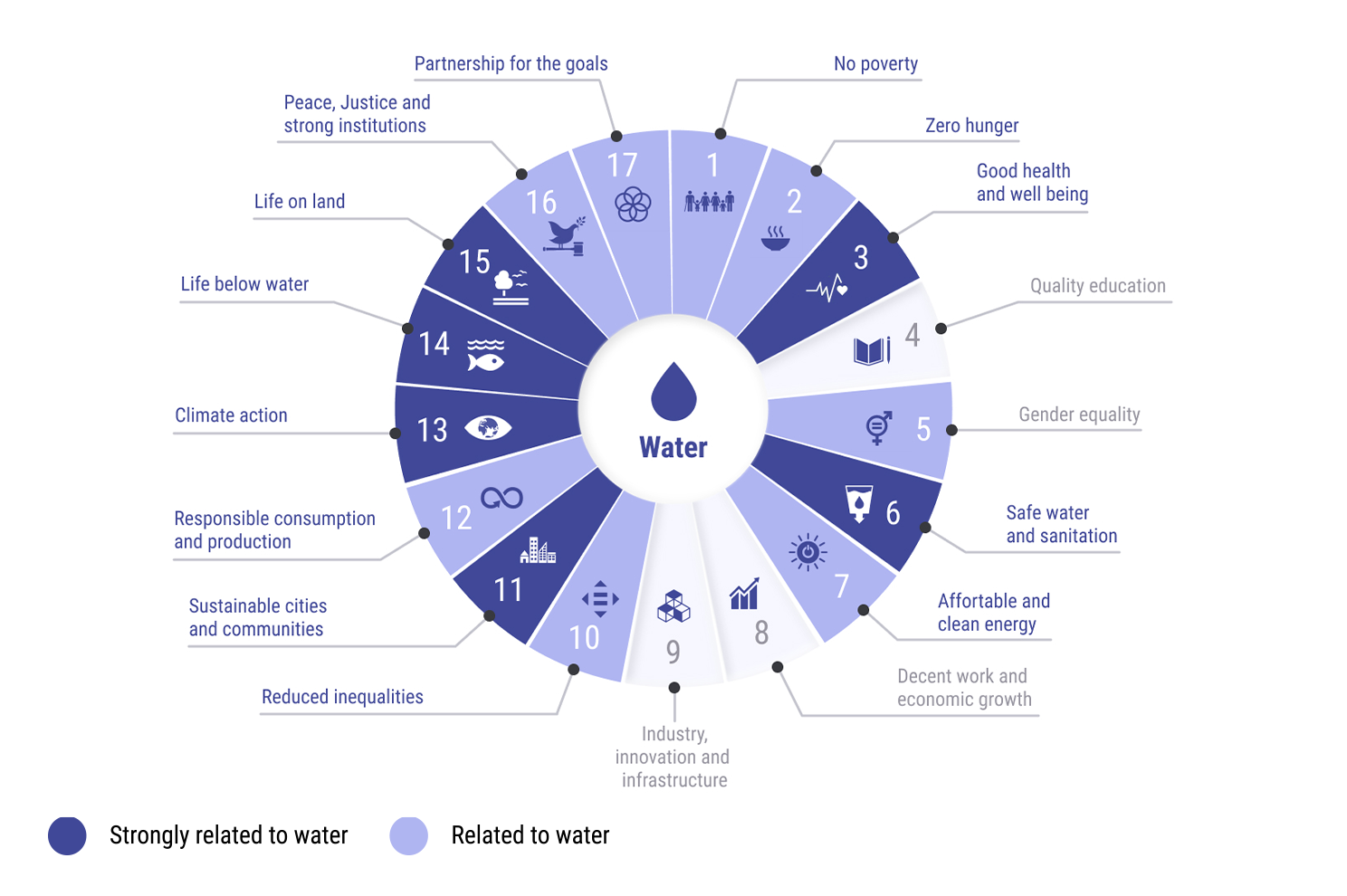As a WASH practitioner working for a data for development organisation, I'm keenly aware of the importance of water in our efforts to reach the Sustainable Development Goals (SDGs). Water is strongly linked to most of the SDGs - from climate action to good health and wellbeing - and has a huge impact on the world’s capacity to reach the targets set for 2030.
In last year’s annual report, the Global Water Security and Sanitation Partnership identified three main challenges facing the water sector today:
-
The world is not on track to reach SDG 6: Clean water and sanitation for all.
-
The climate crisis is a water crisis.
-
Water is essential in preventing the spread of COVID-19.
For each of these challenges, there is an underlying data challenge which needs to be tackled first.
| Water challenge | Data challenge |
| The world is not on track to reach SDG 6. About 2 billion people lack safely managed drinking water and 3.6 billion lack safely managed sanitation. If nothing changes, the world will not have enough water to meet demand by 2030. | We need reliable data to use the scarce (financial) resources we have in the most effective way; we need data to promote inclusion by targeting the most deprived people; and we need to support closer monitoring of the sector to efficiently invest. |
| The climate crisis is a water crisis. The link between water and climate change is only just beginning to be fully appreciated. The effects of climate change are felt through water, as higher temperatures lead to more droughts, floods, and rainfall variability. | There is a call to make the invisible visible when it comes to water resources. This can only be done with more reliable data, shared more widely. In particular, water resource management data and models are needed to develop climate resilience plans at community level. |
| Water is essential in preventing the spread of COVID-19. Clean water, sanitation, and hygiene are vital for curbing infectious diseases, yet water is not fully recognised as an integral part of our response to the pandemic. We need water and sanitation for health, education, job creation, and a sustainable environment. | In fact, the water sector could learn from the health sector on how data supported quick political decision-making. The water sector should have the ambition to provide real-time data for decision-making on climate change mitigation as well as health strategies. |
Considering the importance of data in solving these key water problems, it’s crucial that our data experts understand the water sector, and vice-versa, in order to co-create effective solutions.
Learning from water
You’ve probably already heard the expression that data is the new gold, or the new oil. Data was initially compared to gold due to its high value. Soon, we learned that data becomes more valuable when reused, and the comparison to oil was introduced. This comparison really gained ground when big tech companies started extracting data through their platforms to create excess value - mimicking the oil extraction process. However, these comparisons are imperfect. Oil is scarce and finite, while data is an abundant and infinite resource. What’s more, the idea of comparing data with fossil fuel at a time when sustainability is more important than ever seems outdated. So what about data as the new water? Coincidence or not, they share a vocabulary, both using words such as flow, pipeline, leakages, and (data) lakes.
I started looking into the comparison between water and data, and asking how we could apply our lessons learned from the water sector to the data sector in order to overcome the aforementioned data challenges. Here’s what I discovered.
1. The water cycle and the data cycle
As a WASH engineer by education, I tend to see problems in the field through the water (supply) cycle. I’ve been surprised a number of times by how well this thinking applies to data - so much so that the terms are even comparable.
| Water cycle | Data cycle |
| Water ecosystem | Data ecosystem |
| Water production / water capture (from the environment) | Data production / data collection |
| Water treatment / cleaning | Data treatment / cleaning |
| Water quality checks | Data quality checks / data validation |
| Use and re-use (the more it is used, the more value it has) | Use and re-use (the more it is used, the more value it has) |
In the past, water engineers learned to develop water infrastructure according to the water cycle, with methodologies for capturing water, treating water, and supplying water for its eventual use. It is the same with data production, data analysis, and data use.
Before starting to capture water, engineers know exactly what the water will be used for (dam, water supply, irrigation, etc). Each use has a process defined by the water engineers for capture, storage and treatment. The capacity of the people involved in the cycle is evaluated so that operation and maintenance are also estimated to define the overall investment. The water sector, and the development sector at large, has seen incredible steps in capturing data with the opportunities offered by mobile data collection. But this can still be improved by having the data use in mind when developing data systems. Water sector stakeholders can employ the same systems thinking when developing data systems to support decision making, using the right processes with the right data and the right people/skills.
In the same way, water quality standards have been developed depending on water use. For example, the water quality parameters regulation used for irrigation or industry is not the same as for drinking water. Before the water is provided for its use, water quality is checked to ensure that it complies with the standards and is safe for its use. To ensure water quality, international standards and monitoring systems are put in place. The quality of data can be seen in a comparable way. The data quality parameters are: completeness, accuracy, timeliness, consistency, validity, and uniqueness, and different data uses require different levels of data quality. The necessary quality to calculate SDG indicators might not be accurate enough for decisions-making on infrastructure planning by the local authorities. Ensuring appropriate data quality standards for data use saves resources and improves effectiveness in the long run.
Finally, it’s essential to consider technology when it comes to the data cycle and data use. My WASH engineer colleagues working in rural water supply and sanitation know very well that technology alone is not enough to complete the water cycle. A very important part relies on human capacities in operating the water systems. Most of them would not believe in a very sophisticated water processing and treatment technology demanding more energy than solar power can provide (not so long ago, we would not even consider technologies that needed electricity). The same thinking applies in the data sector. It doesn’t help to start with the latest technologies, such as machine learning or Artificial Intelligence, if data use, and specifically the end user, has not been considered. My colleagues have experienced the importance of budgeting for training the mechanics to ensure the operation and maintenance of the water pump. Likewise for the data sector, technological choice should be made depending on the data literacy of the various end-users. Data systems should be made in collaboration with the operators of the system, and capacity building should always be included in the system’s development.
2. Data governance
As a WASH services management student in the Netherlands, I learned the history behind polder management and all the implications this model has for the management of water. Polder management is a participatory approach to water management between citizen, public, and private interests. It has been a model for public private partnership in the WASH sector to enable quicker investments and results in WASH services supply.
In the same way, data governance needs to be carefully thought through and developed in a participatory manner to avoid stakeholders working in silos and prohibiting greater efficiency and sustainability of the overall data system. Policy makers have a key role in regulating data laws and creating a suitable enabling environment, from developing IT infrastructure and capacity to ensuring data security and the protection of privacy.
Every stakeholder has a role to play in this:
-
NGOs and civil society collect a lot of data for their own reporting - too often, this data is lost once the programme cycle comes to an end, and not integrated into national data systems. NGOs and civil society have a key role to play in collecting and sharing data on inclusion to boost advocacy efforts.
-
The private sector operating in the water sector produces data to get funded, and requires data from the public sector in order to plan their investments with confidence. Public private partnerships in the water sector have been integral to investments in water infrastructure and services. Trust and confidence in these partnerships are enhanced by the sharing of high quality, credible data. In the same way, if the private sector invests in technologies for data collection (e.g. satellite and remote sensing) and data analysis (e.g. artificial intelligence and machine learning), similar developments in the data sector can be expected.
-
Academia and research programmes have a lot of niche data on various aspects of water management. There are strides to be made in integrating this data stream into policy making. They also play a role in setting and monitoring international standards.
-
National governments, through the water ministries, play an important role as aggregators and validators of data. In many countries, the data culture is still very linked to power structures and data is not shared with other stakeholders, including countries’ local governments. The local government is heavily involved in decisions regarding water management and WASH services. Data from various stakeholders should be available to them for their decision making.
-
Donors are crucial to shaping the various reporting needs and thus data streams in the water sector. International standards help to harmonise reporting and comparability, but we should not forget the data needs of local decision makers. More attention is needed to reinforce sustainable national water data systems that will serve all stakeholders.
3. Data as a common good

When I started my WASH career 15 years ago, I heard the debate around water as a private good. It influenced the way private entities invested in the water sector. But in 2010, water was recognised as a human right, and therefore a common good. Lately, we’re hearing more about the data right, and in February this year the European Union passed the Data Act. The Data Act is a European legislative proposal that aims to create a framework which will encourage business-to-government (B2G) data sharing. It states that “the public sphere needs an 'ecosystem of trust' which could set out objectives of re-usage of data for the common good.” As a learning from this, the water sector should call for seeing water data as a common good. It will facilitate the setting up of an integrated national data system for data exchange at national level, involving various stakeholders. It will impact the governance of data, boosting the development of a mature data ecosystem to respond to water sector needs.
“Nobody owns the commons; they belong to all. No one person can save the commons; we share responsibility for their existence and future. Some build and strengthen the commons; others weaken and destroy them. Some commons last for minutes, others for aeons. That is why goods in the commons must be created, allocated and/or protected through political mechanisms managed by some combination of government (top-down, formal rules) and community (peer-to-peer, informal norms). Non-exclusion is why governments pay for census data or the GPS- satellite network.”
With the advocacy for water data as a common good, Akvo sees three key benefits:
-
Greater Accountability: Increased data use and an improved data culture can help to develop accountability for citizens from the government and service suppliers. With open data, citizens can advocate and lobby for themselves, and decision-making power can be shifted to the community.
-
Service delivery and better governance: If more data is used for decision making in planning and investment, this will result in better service delivery and governance. Data can also support financial management and efficiency.
-
Business opportunities: With more data and knowledge available, business opportunities can be created and sustained. This will be facilitated by data sharing for confidence building. In particular, better data could be a strong ally for investment plans by financial institutions in the water sector.
In conclusion, improved and integrated data management can help us to overcome the challenges identified in the water sector. Our experience in the water sector can teach us that considering each stage of the data cycle, strong data governance, and treating data as a common good can help us get there.
Are you a water actor looking to improve your data management?



